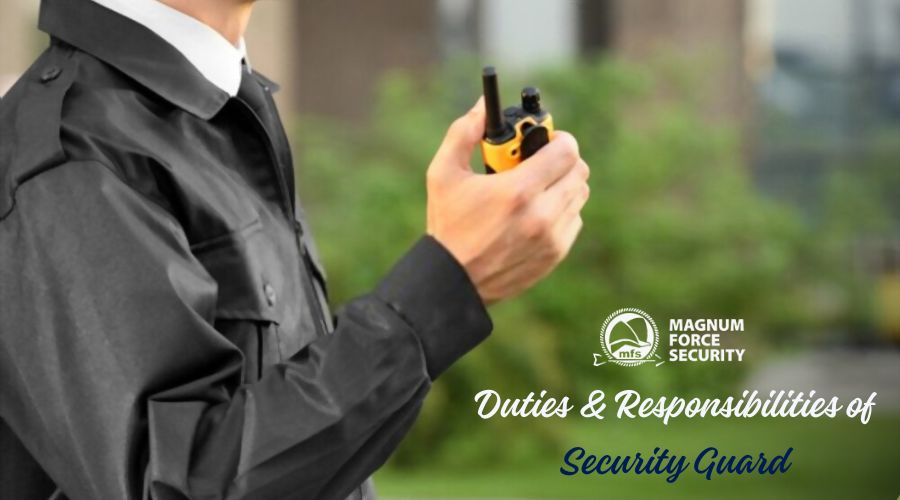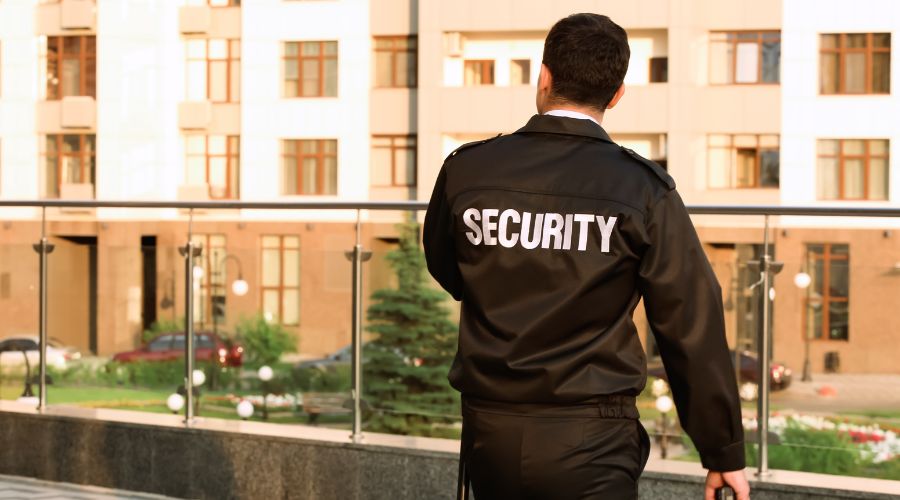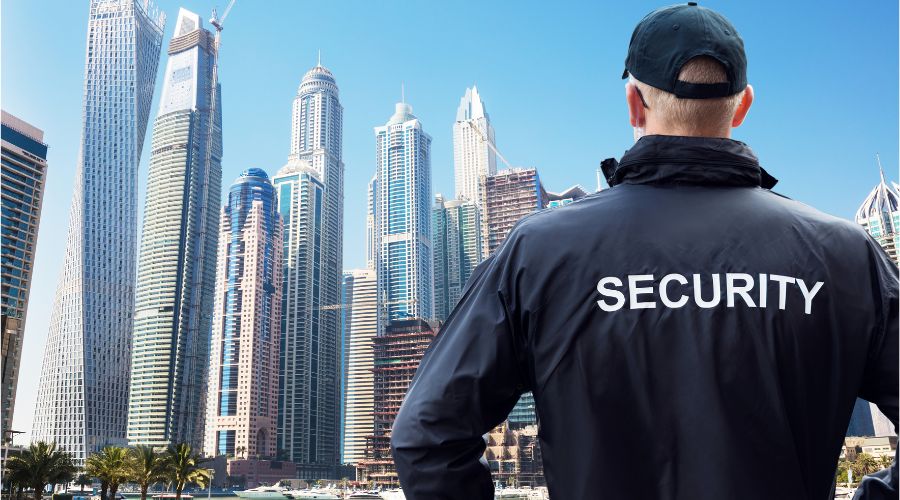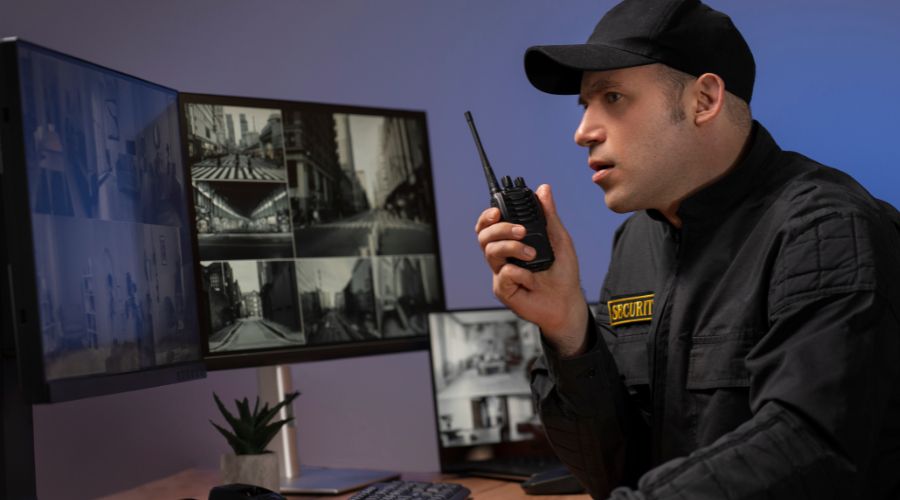Security guards play a vital role in maintaining safety and security in various environments, ranging from commercial buildings to residential areas and public spaces. Their presence provides peace of mind to the public and helps deter criminal activity. In this blog, we’ll delve into the primary and secondary duties of a security guard, the required skills for the job, and the significance of their role in ensuring safety.
Overview of a Security Guard’s Role
Security guards are responsible for protecting property, people, and assets. Their primary objective is to prevent and respond to incidents that could threaten the safety and security of the premises they are assigned to guard. By maintaining a visible presence, they serve as a deterrent to potential wrongdoers and ensure that laws and regulations are followed.
Primary Duties & Responsibilities of a Security Guard
Patrolling and Monitoring Premises
- Conduct regular patrols of the premises, both indoors and outdoors, to ensure all areas are secure.
- Monitor surveillance systems, security cameras, and alarms to detect and respond to suspicious activities.
- Inspect windows, doors, and gates to ensure they are locked and secure.
Reporting Incidents
- Document any incidents or irregularities such as property damage, theft, trespassing, or other criminal activities.
- Write detailed reports that outline the events, the actions taken, and the outcome of the situation.
- Coordinate with local law enforcement or emergency services when necessary.
Deterring Criminal Activity
- Maintain a visible presence to deter criminal activity such as theft, vandalism, and unauthorized access.
- Intervene and prevent potential criminal acts through verbal warnings or, if necessary, physical intervention.
- Engage with individuals in a calm and professional manner to de-escalate situations.
Checking Identification and Permits
- Verify the identity of individuals entering secure areas by checking identification cards, badges, or permits.
- Ensure that only authorized personnel have access to restricted areas.
- Keep detailed records of individuals who enter and exit the premises.
Secondary Responsibilities
Customer Service and Assistance
- Provide assistance to visitors, clients, and employees by giving directions, answering questions, and providing general information.
- Escort individuals to their destinations when needed.
- Offer assistance during emergencies, such as providing first aid or guiding people to safety.
Controlling Access Points
- Monitor and control access to the premises by managing entry and exit points.
- Ensure that security protocols are followed when granting access to visitors, vendors, or contractors.
- Use metal detectors or other security equipment to screen individuals and their belongings.
Emergency Response and Evacuation
- Respond promptly to emergencies such as fire alarms, medical emergencies, or natural disasters.
- Follow established emergency procedures to safely evacuate the premises and guide individuals to safety.
- Assist emergency services by providing critical information and support during incidents.
Required Skills
-
Physical Fitness
- Maintain a high level of physical fitness to perform duties such as patrolling, standing for long periods, and responding to emergencies.
- Be prepared to handle physical confrontations or restrain individuals if necessary.
-
Communication Skills
- Possess strong verbal and written communication skills to interact effectively with the public, colleagues, and law enforcement.
- Be able to convey information clearly and concisely in incident reports and during emergencies.
-
Attention to Detail
- Remain vigilant and attentive to surroundings to identify potential security threats.
- Pay close attention to small details that may indicate suspicious activity or breaches in security.
-
Problem-Solving
- Utilize critical thinking and problem-solving skills to assess situations and determine the best course of action.
- Make quick and informed decisions during emergencies or when dealing with unexpected situations.
Get in Touch with MFS Ghana
- Address: N4, Adenta Municipality, La Nkwantanang-Madina, Greater Accra, Ghana GM118
- Phone: +233-0302-781921
- E-mail: info@mfsghana.com
For all your security needs, trust Magnum Force Security Ltd to provide professional and reliable security services. Contact us today to learn more about how we can protect your assets and ensure your peace of mind.
(FAQs) About Security Guards
1. What is a Security Guard?
A security guard is a trained professional responsible for protecting people, property, and assets by maintaining a visible presence, monitoring premises, and deterring criminal activities. They ensure the safety and security of the environment they are assigned to by enforcing rules and responding to incidents.
2. What Security Guard Job Pays the Most?
Security guard jobs that typically pay the most are those that require specialized skills, training, and higher risks, such as:
Armed Security Guards: Working in high-risk environments like banks, government buildings, or high-profile individuals.
Executive Protection Specialists: Also known as bodyguards, they protect high-profile clients, including celebrities, politicians, or executives.
Cybersecurity Guards: With the increasing importance of digital security, these professionals focus on protecting digital assets and sensitive information.
3. What Are 5 Qualities of a Good Security Guard?
Alertness: A good security guard remains vigilant and aware of their surroundings at all times, ready to identify and respond to potential threats.
Physical Fitness: Maintaining good physical condition is crucial for performing tasks such as patrolling, standing for long periods, and handling emergencies.
Integrity: Honesty and strong moral principles are essential for maintaining trust and carrying out duties responsibly.
Communication Skills: Effective communication is key for interacting with the public, colleagues, and law enforcement, as well as for writing clear incident reports.
Problem-Solving Ability: A good security guard can think critically and make quick decisions during emergencies or unexpected situations.
4. What is a Private Security Guard?
A private security guard is employed by a private company or individual to provide security services for specific locations, events, or individuals. Unlike public law enforcement officers, private security guards do not have the same legal authority but focus on preventing and responding to security issues in their designated area.
5. What Are the 3 Types of Security Guard Forces?
Unarmed Security Guards: These guards do not carry weapons and are typically employed in places where the primary focus is on surveillance, monitoring, and ensuring safety through a visible presence.
Armed Security Guards: These guards are trained and licensed to carry firearms. They are employed in high-risk environments where there is a greater need for active defense.
Corporate Security Guards: These guards work in corporate settings, protecting businesses, employees, and assets. They may handle tasks like access control, monitoring security systems, and responding to emergencies.







